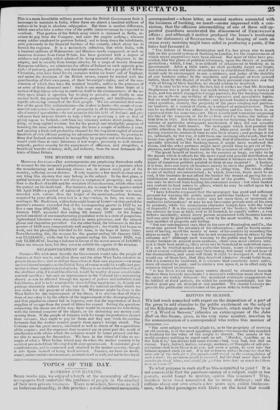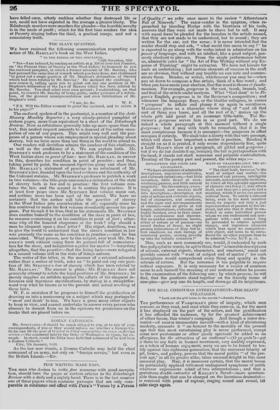MOTIVES TO MURDER.
WE last week remarked with regret on the disposition of a part of the press to add stimulus to the public excitement on the subject of the Edinburgh murders. The Chronicle, which under the head of " A Word in Season," ridicules an extravagance of the John Bull on this theme, gives, in the very same number, insertion to the communication of a correspondent who writes this manner of nonsense :-
" The next subject we would allude to, as to the propriety of reviving an old custom, is of the most appalling nature—we mean the late murders in Scotland for the value of the corpse to dissect. The annals of the world produce nothing to equal such an act. ' Murder, horrible, as in the best it is,' has always had some excuse—bad, very bad, but still an excuse. Envy, hatred, malice, revenge, madness, or thoughts of self-pre- servation—but here there is no cue, not even a grain, to cast into the balance against such an act. It is mist in human nature to conceive that the mere sale if the body for a fru, pounds could ireizh in the contemplation of such a dent,- the premium rat ht he reecieeel, but the fiend must hare loved mut de r for itself alone, and would for pastime have done as much hod there hem no rcwarel."
To what purpose is such stuff as this committed to print ? It is not conceivable that the purchase-money of a subject, eight or ten pounds, could tempt to murder, opines this wiseacre ! Why, murders have been committcd for as many shillings ; and the ruffians about our own streets a few years ago, called bludgeon- men, who felled passengers with blows on the head that would
have felled oxen, utterly reckless whether they destroyed life or not, could not have expected in the average a greatex booty. The Edinburgh murders were murders for plunder—the horrible novelty is in the mode of profit ; which for the first time renders the idea of Poverty singing before the thief, a poetical image, and not a consolatory truth.



















 Previous page
Previous page